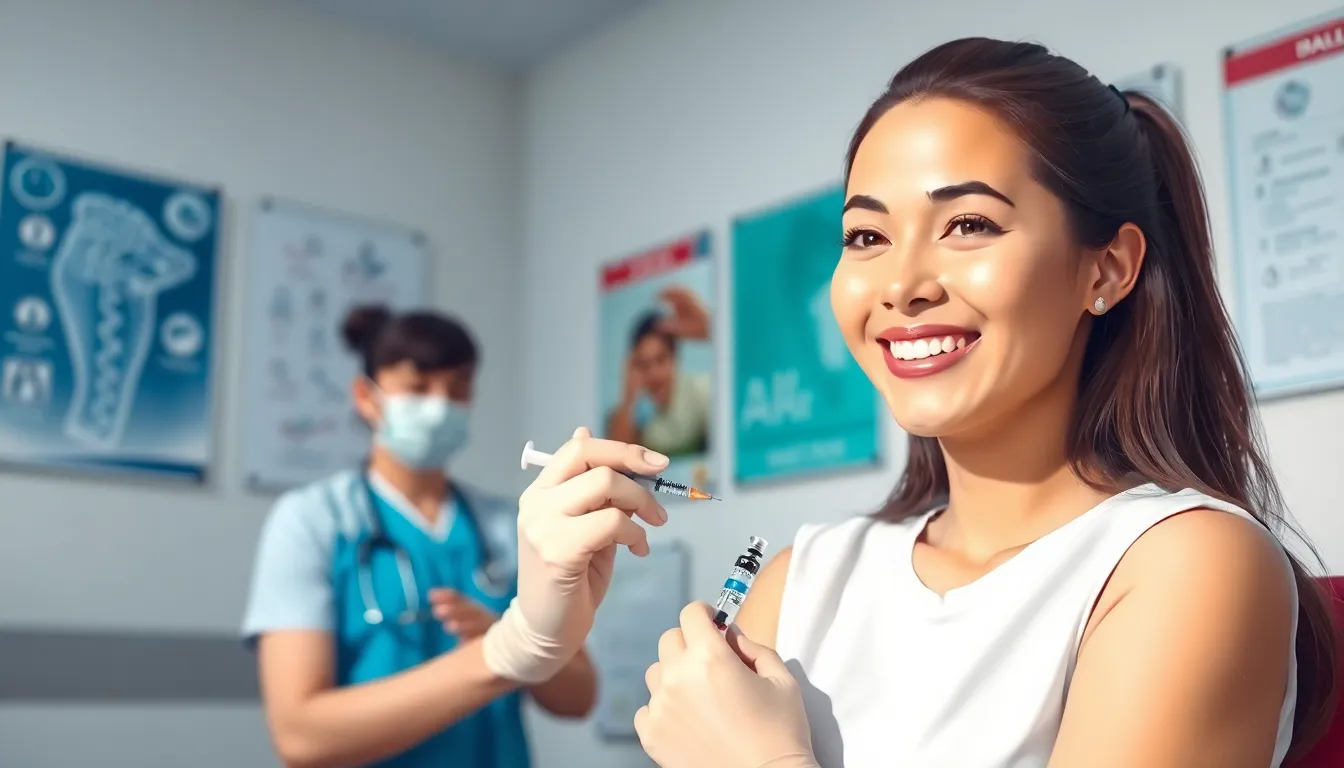Planning a trip abroad? Don’t let pesky germs ruin your adventure! Travel vaccinations are like a superhero cape for your immune system, ready to battle those foreign foes lurking in the shadows. Whether it’s sipping street food in Bangkok or hiking in the Andes, knowing you’ve got the right shots can turn a potential health scare into a worry-free wanderlust.
Table of Contents
ToggleOverview Of Travel Vaccinations
Travel vaccinations protect against various diseases encountered during international travel. These vaccines prepare travelers for potential health risks specific to destinations. Depending on the region, recommendations may differ significantly.
Certain vaccinations, like Hepatitis A and Typhoid, are vital when visiting areas with poor sanitation. Other immunizations, such as Yellow Fever and Malaria prophylaxis, target specific geographical zones.
Timely vaccine administration is crucial, enabling the body to build immunity. Scheduling vaccinations at least four to six weeks before departure maximizes effectiveness. Not all vaccines provide immediate protection, so early vaccination is essential.
Consulting a healthcare professional before travel aids in identifying necessary vaccinations. They evaluate individual health histories and recommend appropriate immunizations based on recent outbreaks. Resources like the CDC offer updated guidelines on required and recommended vaccines for different countries.
Recording vaccination information ensures compliance with entry regulations for various nations. Many countries demand proof of vaccination, particularly against Yellow Fever. Carrying an International Certificate of Vaccination is advisable when traveling to regions with specific health threats.
Traveling unvaccinated poses risks not only for the individual but also for local communities. Some illnesses can spread rapidly, affecting both travelers and residents alike. By prioritizing vaccinations, travelers contribute to global health efforts while safeguarding their own well-being.
Importance Of Travel Vaccinations

Travel vaccinations play a vital role in promoting health during trips abroad. Vaccines shield against infectious diseases prevalent in various regions, ensuring safer experiences.
Preventing Infectious Diseases
Travel vaccinations safeguard against infectious diseases that travelers might encounter. Vaccines like Hepatitis A and Typhoid protect individuals when visiting areas with poor sanitation. Vaccination against Yellow Fever and Malaria is crucial for travelers to specific geographical zones. By protecting against diseases, these vaccines prevent potential outbreaks. Each vaccination strengthens the immune system, reducing the risk of illness and enhancing enjoyment while exploring new cultures and cuisines.
Protecting Local Populations
Travel vaccinations not only protect individuals but also local communities. Many countries mandate proof of vaccination, particularly for diseases like Yellow Fever, to shield their residents. Unvaccinated travelers might introduce diseases to regions with low immunity levels. By getting vaccinated, travelers contribute to local health efforts and help reduce the overall spread of infections. This cooperative approach fosters a healthier environment for everyone, ensuring that communities remain safe from imported illnesses.
Types Of Travel Vaccinations
Travel vaccinations comprise essential shots tailored to protect against diseases prevalent in specific regions. Understanding these types ensures safer travel experiences.
Routine Vaccinations
Routine vaccinations consist of immunizations recommended for everyone, regardless of travel plans. These include vaccines for measles, mumps, rubella, and pertussis. Conditions like tetanus and diphtheria also fall within this category. Staying up-to-date on these vaccines helps build a strong immune foundation. Many healthcare providers suggest scheduling booster shots during annual check-ups to confirm continued immunity. Verification of vaccination status, especially for children, is crucial for compliance with school and daycare requirements.
Recommended Vaccinations By Destination
Recommended vaccinations vary based on destination countries. Traveling to areas with high malaria risk necessitates malaria prophylaxis. Yellow Fever vaccinations are mandatory for certain regions, especially in Africa and South America. Hepatitis A and Typhoid vaccinations are vital for travel to countries with poor sanitation. Individuals visiting Asia or Africa often need these vaccines to minimize infection risk. It’s advisable to consult CDC guidelines for the latest recommendations tailored to specific destinations, especially during outbreaks. Engaging with healthcare professionals ensures personalized vaccination plans for individual needs and travel itineraries.
How To Prepare For Travel Vaccinations
Preparing for travel vaccinations involves careful planning and informed decisions. Understanding the necessary steps contributes to a healthier travel experience.
Consultation With Healthcare Providers
Consulting healthcare providers remains crucial in the vaccination process. They assess individual health histories and recommend appropriate vaccinations tailored to each traveler’s needs. Healthcare professionals keep track of recent outbreaks and ensure that travelers are aware of potential health risks in specific regions. Engaging in a dialogue with a provider allows for clarifications on vaccination types and schedules. Leveraging resources like the CDC during this consultation enhances awareness of updates on required vaccines for various locations. Ultimately, timely advice from healthcare experts significantly influences safe travel.
Timing And Scheduling
Timing and scheduling vaccinations effectively ensures maximum protection. Vaccinations should occur at least four to six weeks before departure to allow the immune system sufficient time to build defenses. Some vaccinations require multiple doses, making early planning essential. Travelers benefit from maintaining a vaccination schedule that aligns with destination-specific requirements. Notable exceptions arise for certain vaccines like Yellow Fever, which may have unique timing regulations. Adhering to these guidelines helps prevent last-minute complications or missed protections, ensuring readiness for the trip. Prioritizing timing fosters a proactive approach to health while traveling.
Potential Side Effects Of Travel Vaccinations
Potential side effects of travel vaccinations vary based on the specific vaccine administered. Common side effects include soreness or redness at the injection site, fatigue, and low-grade fevers. These symptoms usually resolve within a few days.
Vaccinations like Hepatitis A may also cause gastrointestinal discomfort, including nausea or diarrhea. Administering Yellow Fever vaccine could lead to headaches or muscle aches in some individuals. Rarely, more serious reactions such as allergic reactions can occur, necessitating immediate medical attention.
Travelers may experience mild symptoms as their immune system responds to the vaccine. The reactions help signal that the body is building protection against infectious diseases prevalent in travel destinations. Hence, these side effects should not deter individuals from obtaining necessary vaccinations.
Consulting healthcare professionals regarding expected side effects ensures travelers remain informed. Before traveling, they often review vaccination records to clarify any personal health risks related to side effects. Understanding the potential reactions enables individuals to prepare and monitor their health following vaccination.
Adverse effects generally diminish within a few days, but travelers should seek medical advice if symptoms persist or worsen. Knowing what to expect contributes to a smoother travel experience by alleviating concerns over health reactions. Overall, prioritizing vaccinations outweighs the potential side effects, ensuring better health and safety during travels to high-risk areas.
Conclusion
Travel vaccinations are essential for anyone planning a trip abroad. They not only protect individual health but also contribute to the well-being of local communities. By taking the time to get vaccinated travelers can fully immerse themselves in new experiences without the worry of preventable diseases.
Proper planning and consultation with healthcare professionals ensure that travelers receive the right vaccines at the right time. This proactive approach allows for a safer and more enjoyable journey. Ultimately prioritizing vaccinations transforms potential health risks into opportunities for adventure and discovery.



